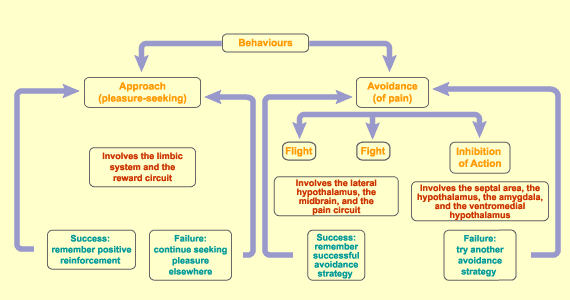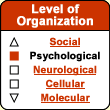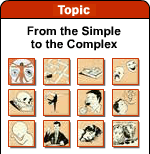|
|


The feedback that our environment
gives us about our behaviours enables us to maintain our
body’s well-being and thus preserve its structure.
This is what Claude Bernard referred to as “re-establishing
the constancy of the conditions of life in the internal environment.” Walter
Cannon called it “homeostasis,” and Freud called
it “the pleasure principle.”
Similarly, the inhibition of pleasure-seeking behaviour
strikingly resembles what Freud described as the conflict
between the “superego” (composed of the social
and cultural taboos of a given era) and the impulsive “id”.

|
|
|
As individuals, we are oriented
toward seeking our own well-being. Hence we tend to approach new
resources, in hope of finding a reward in them for this behaviour.
But in some situations, our past experiences
may have taught us that such pleasure-seeking behaviour might be
punished. Our other behavioural options then include fight or flight (two
ways of eliminating dangers that threaten the body’s integrity)
or inhibiting our behaviour so as to go unnoticed
and thus avoid confrontation.
One can easily imagine the adaptive value
of behavioural inhibition. Suppose a mouse scurrying through the
grass suddenly notices a buzzard flying overhead. Out
of fear, the mouse freezes in place, and so does not attract
the buzzard’s attention. Thus, playing dead until a predator
has passed can be beneficial, as long as the tension of waiting
does not go on for too long.
The following diagram shows how we choose
optimal behaviours and some of the brain structures involved in
this process. This diagram also shows the feedback loops present
throughout this process, whereby our memories let us associate
positive or negative connotations with situations that we experience,
then adjust our behaviour accordingly the next time they arise.

But this whole process falls apart if, for example, you’re
not a mouse hiding from a buzzard, but a worker who has to deal
with a boss who is exploiting you. You cannot fight or flee, or
you would be out of a job. So you let months and years go by while
you inhibit your own behaviour. This can ultimately have disastrous
effects on your health. For one thing, such inhibition causes hormonal
changes that produce high blood levels of gluticocorticoids, whose
depressive effect on immune system function is well known. This
weakening of the immune system is why remaining in a state of behavioural
inhibition for too long can open the door to all kinds of pathologies.
Another situation that can inhibit behaviour
is a shortage of information. To behave effectively, you need a
certain amount of information about the world. If you have not
acquired enough information from your past experiences, or if you
cannot access this information, you may be stuck and not know how
to act. That is why some people freeze up when they have to deal
with a computer, or when they are confronted with death.
But too much information can have the same
effect. Especially in modern societies, we are flooded with information
from all directions–snatches
of information taken out of context from news broadcasts, the
ceaseless torrent of advertising messages, and so on. We have not
learned how to slot all this information into the appropriate levels
in our knowledge hierarchy, so we may feel helpless to act on it.
One final source of inhibition is our imagination,
that quintessentially human faculty, which can make us foresee
so many potentially negative scenarios that we end up doing nothing.
For example, the prospect of rejection has kept more than one ardent
Romeo from declaring himself to his beloved.
|
|





